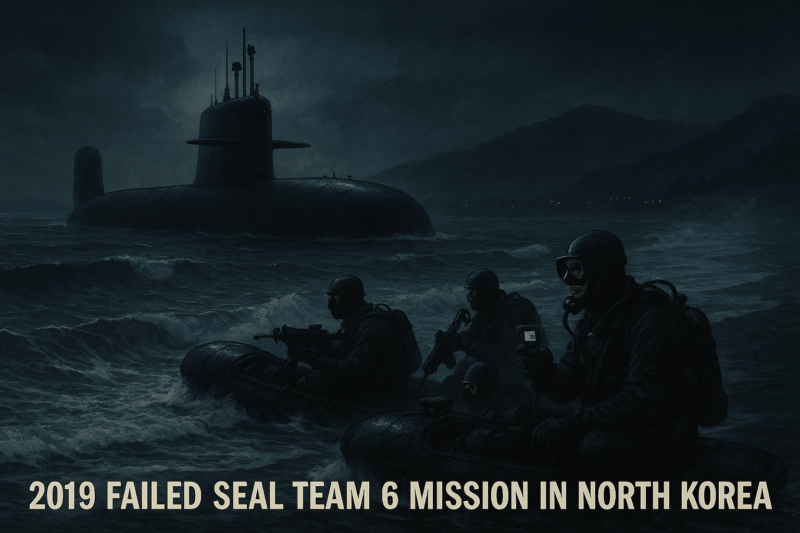Introduction: A Covert Gamble Amid Nuclear Tensions
In the high-stakes world of international diplomacy, a secret SEAL Team 6 North Korea mission ordered by President Donald Trump in 2019 unfolded like a thriller gone awry. As nuclear negotiations teetered on the edge, this clandestine operation aimed to tip the scales with vital intelligence. Yet, what began as a bold intelligence play ended in abrupt failure, leaving behind unspoken losses and heightened geopolitical strain. This revelation sheds light on the perilous undercurrents of U.S.-North Korea relations during a pivotal era.
Human Toll of the Operation
The human cost of this failed covert mission resonates deeply, even in its secrecy. SEAL Team 6 commandos, elite warriors trained for the most dangerous assignments, faced life-or-death decisions on a remote North Korean beach. Encountering an unexpected civilian boat, they opened fire, resulting in the deaths of those aboard—ordinary North Koreans caught in the crossfire of global power plays. While the commandos escaped unharmed, the incident underscores the profound risks to both military personnel and innocent civilians. Families on both sides, though unnamed, bear the invisible scars of such shadows operations, reminding us of the personal tragedies woven into international intrigue.
Facts and Figures of the Mission
Drawing from the reported account, the operation was meticulously planned but swiftly derailed. In 2019, amid ongoing nuclear talks, Trump authorized the deployment of SEAL Team 6 via a nuclear-powered submarine and mini-subs. The team landed at night under harsh winter conditions on a secluded coast, tasked with installing sophisticated surveillance devices near Kim Jong Un’s communication lines to gather real-time intelligence.
The mission faltered almost immediately. Upon encountering the civilian vessel, the SEALs, fearing compromise, engaged, killing the occupants. Commanders promptly aborted the effort, with the team concealing the bodies before retreating. No devices were placed, and North Korea responded by bolstering local security without public acknowledgment. This event preceded a Trump-Kim summit that initially proceeded but ultimately collapsed, highlighting the fragility of the diplomatic process.
Broader Geopolitical and Historical Context
This failed Trump secret operation fits into a larger tapestry of U.S.-North Korea tensions, where espionage has long shadowed diplomacy. During the Trump administration, direct engagements with Pyongyang marked a shift from previous standoffs, yet underlying suspicions fueled aggressive intelligence pursuits. Historically, similar covert actions—such as Cold War-era infiltrations—have escalated conflicts, drawing parallels to this 2019 episode.
In a broader social lens, it reflects the enduring divide on the Korean Peninsula, where ordinary lives intersect with superpower strategies. Climate isn’t a factor here, but the “winter conditions” mentioned emphasize environmental challenges in military ops. The incident also raises questions about accountability in classified missions, echoing debates over transparency in U.S. foreign policy.
Operational Challenges and Response
Subsections reveal key hurdles: The remote beach setting complicated logistics, while the unexpected civilian encounter exposed vulnerabilities in reconnaissance. Emergency protocols kicked in swiftly, prioritizing extraction over completion, which prevented further escalation but at the cost of mission objectives.
What Lies Ahead: Lessons for Diplomacy and Security
Looking forward, this revelation prompts reflection on resilience in U.S.-North Korea relations. Enhanced intelligence protocols could mitigate future risks, emphasizing non-lethal alternatives and better pre-mission assessments. Globally, it serves as a cautionary tale for leaders navigating tense negotiations—balancing bold actions with the potential for unintended human consequences. As denuclearization talks evolve, fostering trust through transparency might pave a path away from shadowy confrontations toward sustainable peace.
Conclusion: Echoes of a Failed Endeavor
The SEAL Team 6 North Korea mission’s failure in 2019 stands as a poignant reminder of the razor-thin line between diplomacy and danger. In pursuing security, nations sometimes sow seeds of deeper mistrust, affecting lives far beyond the headlines. As we uncover these hidden chapters, the call for ethical, measured approaches in global affairs grows ever louder.






